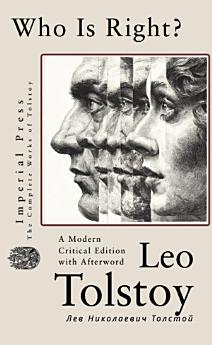Who Is Right?
Über dieses E-Book
The work explores the concept of moral purity and the anthropological unity of humanity, suggesting these qualities transcend national, cultural, state, and civil-legal limitations. It also touches upon the idea of memory loss as a liberation from the burdens of the past. This composition, through its questioning of legal systems and the fate of the exiled, aligns with Tolstoy's broader critiques of state power and societal injustice. The essay's central argument posits that true righteousness derives not from external laws but from individual conscience aligned with universal ethical principles. Through this framework, he challenges readers to reconcile personal beliefs with actions, advocating for moral consistency as the foundation of authentic human existence. This work exemplifies Tolstoy's lifelong commitment to nonviolent resistance and ethical living, themes that would continue to resonate in 20th-century social justice movements.
This critical reader's edition presents a modern translation of the original manuscript, crafted for the modern reader with clean, contemporary language and simplified sentence structures that clarify his complex Russian phrasing and specific antiquated references. Supplementary material enriches the text with autobiographical, historical, and linguistic context, including an afterword by the translator on Tolstoy’s personal history, impact, and intellectual legacy, an index of the philosophical concepts he employs—emphasizing Existentialism and influence by Schopenhauer—a comprehensive chronological list of his published writings, and a detailed timeline of his life, highlighting the personal relationships that shaped his philosophy.




